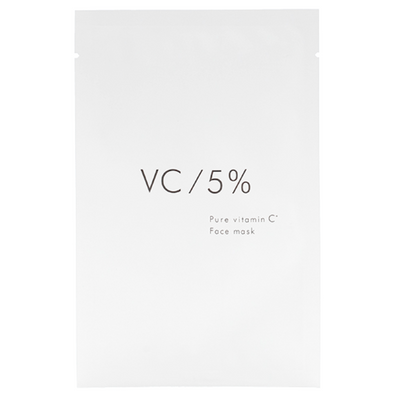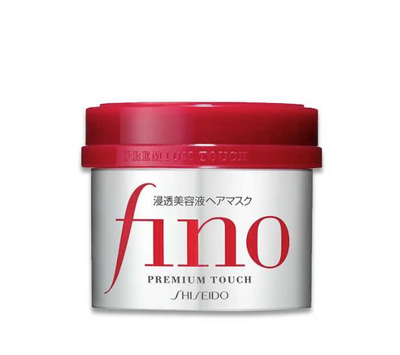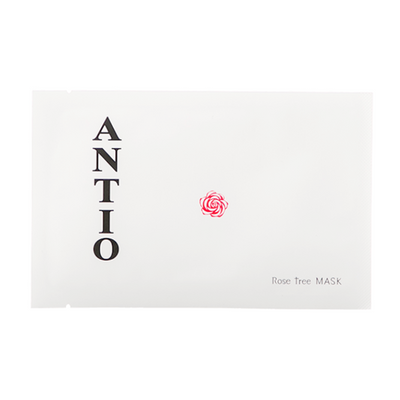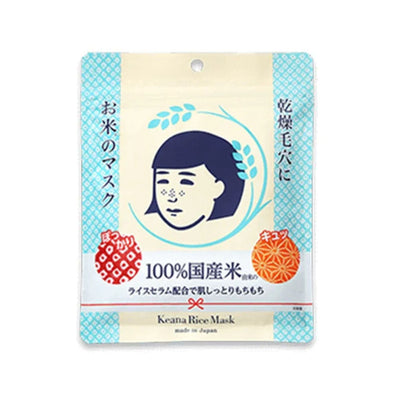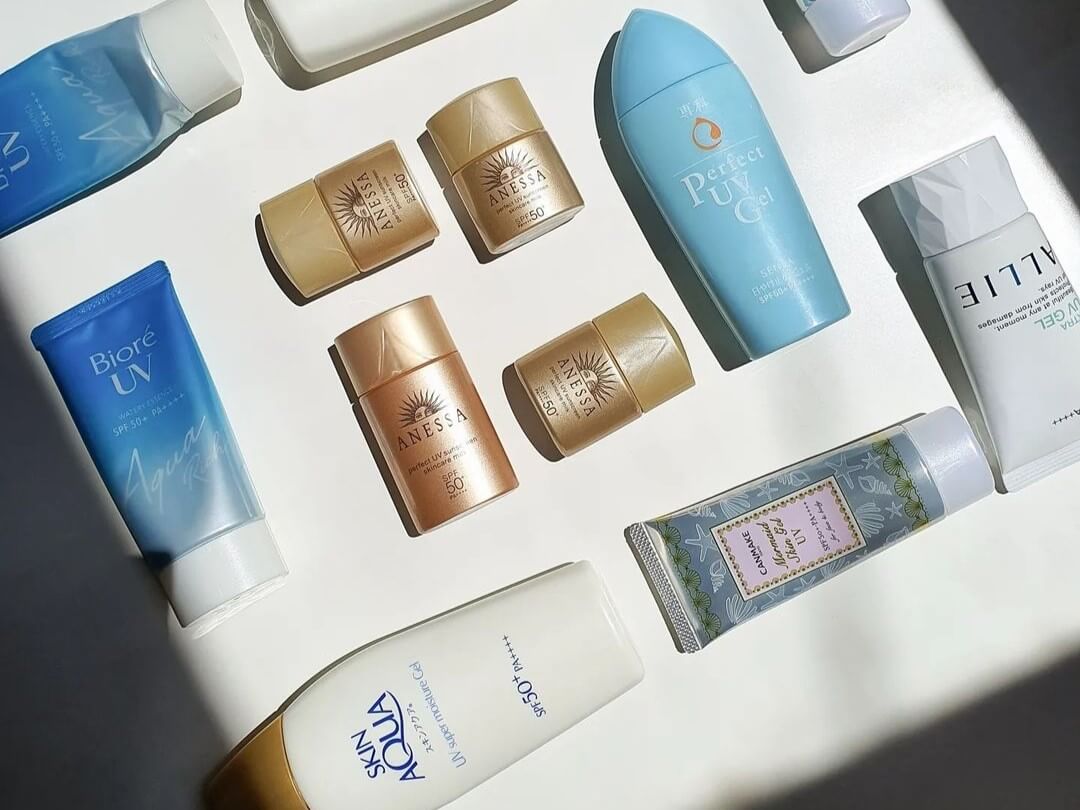Sunscreens and UV protection are extremely important for taking care of the skin long-term, avoiding skin damage and, most importantly, preventing skin cancer. One country that takes its sun protection very seriously is Japan. That might be why so many beauty influencers and dermatologists on social media rave about some of the Japanese sunscreens out there on the market!
Today, we’re going to talk all about Japanese sunscreens, including what sets them apart, some of the misconceptions around them and some recommendations of Japan’s top UV care products towards the end!
What’s So Great About Japanese Sunscreen?
Highly Effective
Japanese people value their skin, with many people avoiding sun damage with the use of sunscreens and skin coverings. One of the results of this is that Japanese standards for sunscreens are really high—both for individuals and for government agencies. This leads to tons of products that are effective in preventing sunburn, sun damage and discoloration or hyperpigmentation caused by sun damage.
Lightweight
Japanese makeup and skincare tends to be lighter on the skin than western makeup due to both the humidity here in Japan as well as the preference for lighter, natural-looking makeup. The same goes for sunscreens, with Japanese sunscreens tending to go on as a lightweight layer that sits nicely on the skin. This also allows them to be easily worn, even under makeup.

Japanese sunscreens really do go on as smooth as butter. Plus, the sprays and sticks just glide on easy. Image via Unsplash
Little to no white cast
As a person of color myself, the white cast from sunscreens has been my enemy for as long as I’ve worn sunscreen. However, switching to Japanese sunscreens has been a lifesaver. Japanese folks also generally don’t like the white cast, so Japanese companies also tend to avoid making sunscreens that leave that heavy white film.
Tons of Variety
Sunscreens in Japan are as varied as the people using them. Of course, we can enjoy the variety of chemical sunscreens, physical sunscreens and hybrid sunscreens. However, it doesn’t end there. There are sun lotions, UV mists & sprays, UV sticks, and more. Add in the different finishes, tints, strengths and more, and you’ll see why the sunscreen aisles are so big in Japan.

Even one brand can have a variety of UV products, like these sunscreens with a rose scent and a cooling effect version alongside the normal type. Image via Instagram (@cosme_hunter)
Common Misconceptions about Japanese Sunscreens
"They bleach or lighten skin"
One thing that I used to hear when I first came to Japan over 10 years ago was that you had to be careful with skincare items because they could contain bleach, especially sunscreens. And the thing is—I believed it! I was so wary of so many skincare products. However, I can tell you that there was no need for me to worry all of that time.
Japanese sunscreens don’t have any proven skin lightening or bleaching chemicals. Even the Tokyo Metropolitan Institute of Public Health(JP) says that, although they may prevent dark spots caused by melanin production or sun damage, no Japanese product will actually make your skin whiter. So where did this misconception come from? Well, there are three reasons why this idea comes up.
Past products
In the past, some products in Japan contained chemicals that reportedly whitened or lightened skin tone. However, looking back at the history of those products, you’ll notice they basically vanished in 2011. This is because the Japanese government mandated a recall of those types of products sometime before 2011.
The only product we read about sold into 2012 is one made by a company (that will remain unnamed). This company actually got into a lot of trouble with the Japanese government because they failed to recall their products from overseas, resulting in several incidences of bad reactions. Those types of products haven’t been seen in the Japanese market since.
Marketing
The beauty standard in Japan has been whiteness for a very long time, mostly for women. Just take a look at traditional Japanese art for examples. This beauty standard also leads to some companies and brands using the term “white” or “whitening” to push products to Japanese women (as well as an increasing number of men recently).
In reality, these "whitening" products don’t whiten, instead just brightening the already lighter skin tone of Japanese consumers.

Plenty of people of color, including myself, use Japanese sunscreens to take care of our melanin-rich skin. Image via Instagram (@chikosrx)
Mistranslation and Direct Translation
Translation errors and strange direct translations are the sources of some interesting (and funny) moments in Japanese media and products. For example, Valentine’s Day in Japan became a one-sided holiday most likely due to a mistranslation. The same goes for many skincare products in Japan.
A lot of products get called ‘whitening’ despite them just being brightening products. Since these products may be long-standing, they just keep the words ‘white’ or ‘whitening’ in their product name or packaging. It might also be an issue of direct translation and cultural context. One of the words you often see in Japanese advertising is ‘bihaku’, which combines bi (beauty) and haku (white) to mean beautiful, white skin.
"Japanese sunscreens are weaker"
For some, Japanese sunscreens are weaker than non-Japanese sunscreens. While we don’t deny other people’s experiences, we do believe that it depends on the sunscreen, just like it does anywhere else. One of the sources for this idea may come from the way Japan generally separates sunscreens into two groups—daily use and sport/outdoor sunscreens.
Daily use sunscreens are for just that—daily use to go to work, hang out with friends, lounge at home (if you have windows and sunlight shining in), and run errands. Sport and outdoor-friendly sunscreens are the ones made for when you’re going to sweat, go out for a beach/pool day, or going for a workout or run.
That means that daily use sunscreens may not be as effective on those days where you’re out and about or may have to be applied more often on those days. That’s why matching the purpose of a sunscreen and your plans for the day is important.
There isn’t much formal research comparing Japanese sunscreens to those from other countries, but plenty of people find that the right sunscreens from Japan can hold their own against some of the best sunscreens from other countries.

The important thing is finding a sunscreen that works for you and your needs! Image via Instagram (@hoarderbeauty)
Thing to Consider When Choosing a Japanese Sunscreen
Personal Preference
Of course, you’ll want a product that fits your personal preferences. Japan tends towards chemical and hybrid (chemical and mineral) sunscreens to avoid white cast, but Japanese mineral sunscreens do exist as well. There are also preferences around fragrance vs. no fragrance, size, lightness, application method, packaging and many more.
Ingredients
As with any cosmetic or skincare product, at least knowing what ingredients react well with your skin is important. If you have any sensitivities or allergies, just do a quick check to make sure you get the right product for you.
Situation (a.k.a Your Plans)
While many sunscreens in the West are made more so for general wear, Japanese sunscreens usually fall into one of two categories—everyday use and sport/outdoor use. Daily use sunscreens are made for wearing out for work, shopping or hanging out with friends. However, if you’re going to sweat a lot, exercise or go swimming, going for a waterproof sport sunscreen is generally the way to go.

The beach is exactly what a sport sunscreen is made for! A good example is the Shiseido Ultimate Sun Protector, perfect for the beach. Image via Unsplash
Finish
This is kind of a subset of personal preference, but we have a reason for putting this separately. Generally, we may think about the finish as being matte, glossy, moist, or something of that nature. However, we can’t forget sunscreens can have a tint that helps to bring out the best of your natural skin tone.
Many of the Japanese tinted sunscreens are called “tone-up” sunscreens and have a slight hue to them to complement your natural skin tone. They also tend to be great for going under makeup to create a natural glow.
Strength
Japanese sunscreens operate on the same two systems as many other countries—the classic SPF system and the PA system. The PA in Japan indicates the level of protection against UVA rays with four different levels. There is an official measurement to determine the strength, but you really only have to worry about the strength level.
The levels start at PA+, which is strong protection against UVA rays, and the highest currently is PA++++ which is the strongest level of protection. Generally, you want to aim for as many +’s as you can. Lower PA levels tend to be for makeup products like foundations or creams.
Popular Japanese Suncreens
Let’s take a look at some of our personal favorites and some of the most popular products in Japan at the moment. A lot of these products are in the top of the sunscreen and UV protection category of @cosme(JP), a Japanese website that compiles user reviews and consumer votes as well as sales figures to show what people are buying in Japan.
Nivea Japan UV Deep Protect & Care

Nivea is a worldwide brand, but this sunscreen comes from Nivea Japan and is made here in Japan! Image via Instagram (@charlotte_lime)
Nivea isn't a Japanese company, but Nivea Japan is a subsidiary that makes tons of Japan-exclusive products with their own unique formulas. Two of those Japan-only products are their very popular UV Deep Protect & Care products.
The first is a gel and the second is their essence. Both are waterproof and sweat-resistant while providing SPF 50+ PA++++ protection. They both also have hydrating ingredients as well, so they’re great for your skin. The essence version is also great for putting on under your makeup, while the gel is great for full-body application.
Biore UV Aqua Rich Watery Essence

This next sunscreen is a favorite among beauty bloggers and enthusiasts. Image via Instagram
Biore is an amazing Japanese brand from Kao that makes all kinds of affordable yet high-quality skincare products that many Japanese people and Japanese skincare enthusiasts love. Their UV Aqua Rich Watery Essence is a standout among their products for its strong SPF50+ PA++++ protection and its super lightweight watery feeling. It’s also waterproof, can be applied under makeup and can be used on the body as well as the face.
Anessa Perfect UV Skin Care Milk

Anessa is another popular brand, and their new formula has become another J-beauty favorite. Image via Instagram (@searchofglow)
Anessa is one of the most popular sunscreens coming out of Japan. Anessa is a brand of the massive, high-quality skincare company Shiseido. The Perfect UV Skin Care Milk is one of the best-selling Japanese beauty items so far this year according to @cosme.
Their most recent formula has everyone raving with the high SPF50+ PA++++ protection and the fact that it’s the most water-resistant in the Anessa line so far. It’s good for either the face or body and is great for both daily use and for sports. It's also 50% skincare ingredients and has a fruity-floral scent!
Skin Aqua Tone-Up UV Essence
Skin Aqua is one of the product lines from the pharmaceutical brand Rohto. This is another popular sunscreen because of both its SPF50+ PA++++ strength and its color. These sunscreens have a colored tint to them that helps to provide color control based on your skin tone for a glass skin effect.
You can get these in lavender (for brightness), mint green (for redness), rose (for a flush look and dark spot coverage) and latte beige (for color blemishes). It’s waterproof, usable on the face or body, and is great for using under makeup as a base.
Canmake Mermaid Skin Gel UV

This sunscreen is perfect for that moist look and great for those with dry skin. Image via Instagram (@cactus_skin)
Canmake is another Japanese makeup and skincare brand popular among young Japanese women for its quality, affordability and trendy products. Canmake’s Mermaid Skin Gel UV is a perfect example of why Canmake is popular. It gained popularity thanks to its amazing tint for a more even skin tone and its watery texture that creates a moist sheen that's perfect for a mermaid princess.
It provides plenty of moisture and protection too, with an SPF50+ PA++++ strength that can be applied over the face or body. It can also go on before you apply makeup and over makeup for reapplication. The clear version is particularly great for us brown or dark skin folks once rubbed in.
AYURA Water Feel UV Gel
Ayura is another popular brand specializing in skincare products and tools, particularly products geared towards women. This Water Feel UV Gel gets its name from its moist, smooth feeling that goes lightly on the body and face.
It also provides strong UV protection with SPF50+ PA++++ protection. It’s waterproof as well, while also having a nice herbal scent and leaving a glow without being greasy.
Kanebo Allie Chrono Beauty Facial Gel UV

This facial sunscreen comes in a variety of tints, but it also comes colorless! Image via Instagram (@shinysiopao)
Kanebo is another massive skincare and makeup company, and Allie is currently one of their best-performing sun protection products. The Chrono Beauty Facial Gel UV is currently sitting at number 8 on @cosme’s top 10 list for UV protection products.
This UV gel is another strong item with SPF50+ PA++++ strength. It also has moisturizing ingredients, prevents oiliness and is both water and sweat-resistant. It’s beach-safe, so it’s great for wearing on a pool/beach day. Their UV milk is also very popular.
Orbis Wrinkle Bright UV Protector
Orbis is another Japanese company specializing in makeup, skincare, hair care and body care. Their products tend to sell at a slightly higher price point but is known to be well worth it. Their Wrinkle Bright UV Protector is another top product on @cosme and was a winner of @cosme’s best cosmetics item awards for 2023.
This sunscreen features the same max strength of SPF50+ PA++++. However, it’s also popular for its brightening effect and its positive effect on wrinkles, making it perfect for aging care and for use under makeup.
Elixir Day Care Revolution
Elixir is another brand under Shiseido that is also known for its high-quality skincare which has a slightly luxurious image but with more affordable prices. The Elixir Day Care Revolution series has three variations that fits Elixir's image exactly.
The first is the regular Day Care Revolution, that offers moisture and maximum UV protection Tone Up Sunscreen SPF50+ PA++++. They also have a tone up version that is the most popular this year in Japan according to @cosme. It has a baby pink pearl hue to it that helps to even out the natural skin tone and cover blemishes while offering the same UV protection. It's so popular that we sold out of it!
The third version offers a glass skin effect with their UV Protector series.

This product has really taken Japan by storm and we can totally understand why. Image via Instagram (@nc25_rh413)
And that’s our list! Japanese sunscreens really are great and deserve all of the praise they get. Japan has a huge variety of UV protection products, so there’s surely a sunscreen that fits your needs. Let us know your favorite products or any that you’d like to try!
